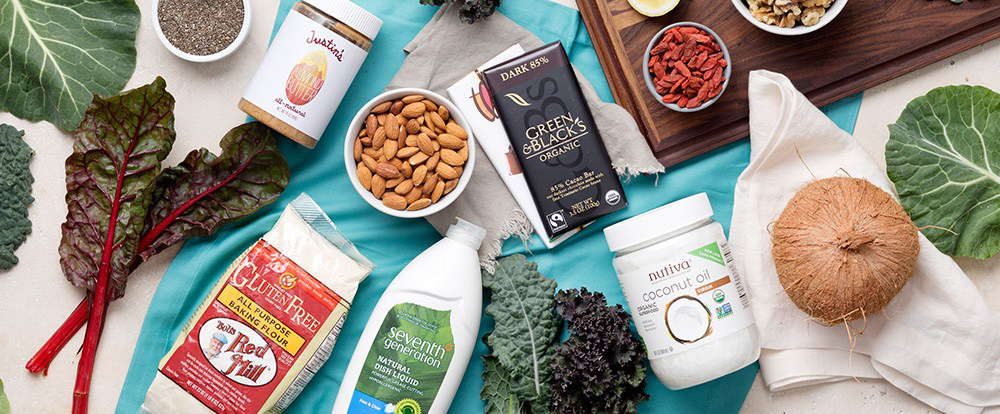
Coconut Oil vs. Olive Oil – Comparison Chart
Extra Virgin Olive Oil |
Virgin Coconut Oil |
| Primary fat: Oleic acid, a monounsaturated omega-9 fatty acid.73% Monounsaturated; 14% Saturated; 11% PolyunsaturatedOmegas: 9% omega-6; 0.7% omega-3 (13:1 omega-6 to -3 ratio)
Goodies: Antioxidants; Vitamins E and K; Trace iron Smoke Point: Nutrients stable at 200-340°F (higher quality EVOO = lower smoke point) Great for: Salad dressings, spreads, dips, low-heat cooking, food processor Storage: dark opaque glass container stored in a cool, dark place Consistency: Liquid at room temp Shelf Life: one year Labeling: Virgin + Extra Virgin differ |
Primary fat: Lauric acid, a medium-chain “good” saturated fat.87% Saturated; 6% Monounsaturated; 2% PolyunsaturatedOmegas: 3% omega-6; 0% omega-3. (No ratio)
Goodies: Antioxidants; Trace Vitamins E and K; Trace iron Smoke Point: Nutrients stable up to 350°F Great for: Margarine substitute, spread, baking, frying, higher-heat cooking Storage: cool, dark place, though less susceptible to heat & UV damage. move to glass container if wary of plastic. Consistency: Solid below 76°F; Liquid is normal Shelf Life: at least two years Labeling: Virgin + Extra Virgin the same; arbitrary |
Extra virgin olive oil (EVOO) and Virgin Coconut Oil are both natural, unprocessed oils known for their healthful benefits. Neither is necessarily better in every way, but contrasting the two shows us which is better for different uses.
Food Uses
The most practical difference between extra virgin olive and coconut oil has to do with what foods you can best prepare with each. To get the benefits of olive oil, it’s best used in salad dressings, sauces and spreads (vinaigrette, basil pesto, hummus) because of its lower heat resistance. If an oil with a low smoke point is overheated, the fats can break down and create free radicals (toxic, unstable atoms). By the way, the range of smoke points for olive oil on the chart mean it can differ. Generally the higher the quality of the extra virgin olive oil, the more easily damaged by heat!
Virgin coconut oil, however, has a consistently higher smoke point. This is because of its high level of saturated fat, which tends to withstand extreme elements better. This also accounts for its longer shelf life. After all, it is an oil from tropical environments! Forgo the olive oil when cooking and go with coconut oil for baking and frying. (Don’t get me wrong — it’s still fantastic and super healthy uncooked.)
Different Fats
Why might you want to get both? Because they are made of totally different fats with their own nutrition benefits. At first blush it might seem like olive oil is better than coconut oil because of coconut oil’s high saturated fat, but saturated fat is actually good for you. And coconut oil’s saturated fat is unlike most — it’s mostly lauric acid, a medium-chain fatty acid that is easily turned into energy instead of stored as fat by the body, and that has amazing antimicrobial, antifungal, antibacterial, antiviral, metabolism-boosting properties. It raises HDL (“good” cholesterol”) and is less risky than other saturated fats.
The monounsaturated fat in olive oil is mostly oleic acid, an omega-9 fatty acid. This trait is primarily popular as a substitute for saturated fats, due to the belief that saturated fats are unhealthy. Still, its positive effects include lowering LDL while raising HDL, delaying the onset of ADL, and lowering blood sugar and blood pressure.
Omega 6-3 ratios
Olive oil has many more omega-6 fatty acids than coconut oil. The American diet is over-saturated with omega-6 fatty acids, which should be balanced with the amount of omega-3s one gets. Depending on what you read, the best ratio appears to be 3:1 (3 times the intake of omega-6 as the omega-3 and no more) to 1:1. Olive oil’s ratio is 13:1. Coconut oil has only 1/3 the omega-6s. It doesn’t have omega-3s, but this means you will have to supplement much less omega-3 per tablespoon of coconut oil, whereas you would need to supplement to make up for the ratio in olive oil quite a bit more.
Now hopefully you know a lot more than you did before about the benefits of coconut oil vs. olive oil! If you want to buy coconut oil to start reaping its rewards in your life, check out the post How to Choose the Best Coconut Oil to Buy.








